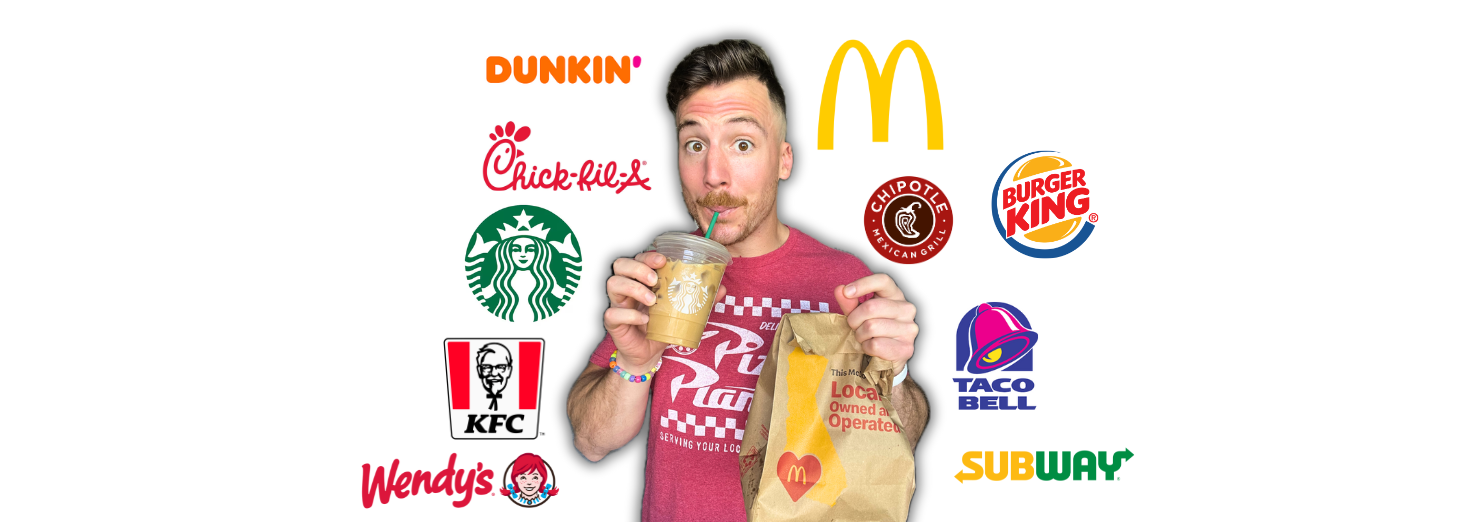Have you been trying to lose weight while figuring out how to stay full in a calorie deficit?
I'm sure this scenario sounds familiar...
The diet starts on Monday. You plan ahead your meals, you get back into the gym, and you are crushing it!
But... Thursday or Friday rolls around. and the growling from your stomach is getting louder.
You start to get hangry. “It feels like my stomach is eating itself!”
The box of donuts that your coworker brought into the office start to grab your attention... and you remember when you get home there is a fresh bag of chips in your snack pantry.... *Hangry Monster Engaged!

This has happened to all of us. And that is why I am here to save the day.
In this article, I’m going to give you 10 practical tips to manage your hunger while trying to lose weight and teach you how to stay full in a calorie deficit.
Let’s get into it!
First…
As you may know, In order for fat loss to happen, you have to be in a calorie deficit (#science).
By the way, if you didn't know that, that's ok! But make sure you go read my article, The Ultimate Guide to Fat Loss, so you can learn everything you need in order to lose weight and lose fat!
This means the total number of calories you eat needs to be fewer than the number of calories you expend, equaling a calorie deficit.
With that being said, your body has been used to eating a certain amount of calories for so long now, and this is what it expects. When you put yourself into a calorie deficit, there will be moments of hunger, and that is okay.
Hunger is not an emergency. But we also don't want you to become ravenous to the point that you eat enough to feed a small village. We just want it to be well-managed so you can have a sustainable approach to your fat loss journey.
(Also, make sure to read my blog on The Difference Between Hunger vs. Appetite so you know the difference!)
Ok, let’s get into it!
1. Eat Your Protein

Protein is going to be the most satiating macronutrient (by the way, macronutrients are Proteins, Carbohydrates, and Fats). When it comes to managing hunger, eating a sufficient amount of protein is going to leave you feeling full.
Protein will also take more time to digest, which helps you feel fuller and more satisfied for longer.
You should aim for .7 grams of protein per pound of your goal body weight at a minimum. AT MINIMUM, so you can always have more!
Make sure you go check out my article “How to Increase your Protein Intake”, so you can get all the tips you need to learn how to increase the amount of protein you are having daily.
If you want to learn more about protein, make sure you read how to increase your protein intake!
2. Eat Big Bang for Your Buck Foods (or Volume Foods)
I don’t know about you, but I know when I eat, I like to enjoy a decent volume of food.
This is where these big bang-for-your-buck foods, or volume foods, can come into play.
These foods are where you can eat a bigger portion and a lot more volume while still not putting a huge dent into your overall calories for the day.
A majority of these foods will be from protein, fruits, and vegetables.
If you have a huge salad every day for lunch, you get a good amount of volume from all the vegetables, which will help physically fill up your stomach and keep you full!
Here are some volume foods that will fill you up for fewer calories:
- Salad with 4 cups of mixed greens, 4 ounces of grilled chicken, a sprinkle of feta, a tablespoon of olive oil, and 2 tablespoons of balsamic vinegar for under 500 calories
- 1 pound of watermelon for under 150 calories. YES, 1 F*CKING POUND!

- 1 pound of strawberries for under 150 calories. AGAIN, 1 F*CKING POUND!
- 1 pound of cut of cucumbers for under 75 calories (add some dressing to dip into will make it roughly 100-125 calories)
- 1 pound of cut of raw peppers for under 100 calories (add some dressing to dip into will make it roughly 125-150 calories)
- 1 of cup of Fat-Free Greek Yogurt is 130 Calories (PS: check out my blog on why greek yogurt is a game-changer for weight loss)
Throwing in all your favorite proteins, fruits, and veggies is a great way how you can stay full in a calorie deficit.
3. Avoid Drinking Your Calories
Drinking your calories tends to not be a great bang for your buck.
A Starbucks grande caramel Frappuccino has 420 calories. If you are drinking that for breakfast, you already have consumed a huge portion of your calories for the day!
High-calorie drinks can quickly add up in calories and, in return, aren't going to fill you up. This will give you less room to physically eat your calories.
Even drinks that are marketed as “healthy” still can be full of 300+ calories from not having that much to drink.
I’m not saying you can’t drink your calories and lose fat, I am saying it may challenge your hunger and be hard to stay full while in a calorie deficit.
Get a majority of your fluid intake from water, sparkling water, and seltzer water. And if you want something a little different, lean towards coffee (black or with a splash of cream/ your milk of choice), diet sodas, and 0-calorie drinks like Gatorade 0 and Powerade 0.
4. Watch Your Alcohol Intake
Before I get into this, you can still lose weight and drink alcohol.
I am not telling you to completely cut out alcohol, but I would recommend watching your overall alcohol intake.
For the same reason above, it's not a great bang-for-your-buck.
These calories add up and don’t help with managing hunger.
And not only that, what else happens when you have a couple of cocktails?

Yup, you find yourself dancing on top of the bar with your shirt off with a drink in one hand and a slice of pizza in the other.
No, that's not you; just me?
Well, anyways…
Alcohol leads to getting a case of the “f*ck it.’
The “f*ck its” are when you have a couple of drinks, loosen up a bit to either continue drinking more, call Dan, the door dash guy and order all the late-night snacks.
Again, I'm not saying you can’t drink alcohol.
I am just saying if you drink often, you will want to find a way to manage your intake so that you can make progress on your fat loss journey.
5. Eat at Consistent Times
Eating at consistent times each day can make hunger management a whole lot easier.
When you set a consistent eating schedule, it will help regulate & establish your hunger hormones, ghrelin and leptin.
Gherlin is the hormone that signals hunger.
Leptin is the hormone that signals when you're full.
If you start eating consistently at the same time each day, it will help you better predict when you will be hungry and when you should eat.
6. Go to Bed
Let's continue with the hunger hormone talk.
When you are getting a sufficient amount of sleep, your body will have higher levels of leptin, meaning you will be less hungry throughout the day.
When you're in lacking sleep, your body will have lower levels of leptin and higher levels of ghrelin, meaning you will get more signals of hunger throughout the day.
Not only that, but your physical and mental energy goes down, so you’ll have less physical energy, which will make getting in your movement and workout for the day more challenging, and less mental energy to make decisions more challenging behind your nutrition and behaviors.

So, all in all, go to bed and get your 7-9 hours of sleep a night.
7. Don’t Over Restrict Your Calories
Stop eating 500 calories a day.
There is a reason why you are acting like a bear who just came out of hibernation, and you clear out the entire fridge in one night.
When it comes to making long-term, sustainable fat loss progress, do not try to starve yourself to try and make progress as fast as possible.
Eat as many calories as possible while still being able to make progress.
Again, you can go check out my entire blog, “The Ultimate Guide for Fat Loss,” to find your starting calorie target.
8. Don’t Over-Restrict Your Favorite Foods
Make sure to include your favorite foods during fat loss.
Allowing yourself to enjoy your favorite foods will be beneficial, especially when managing hunger.
If you completely deprive yourself of the foods you love, it can lead to feelings of frustration and increased cravings, potentially having you clean out the cookie jar.

Instead, incorporate these favorite foods into your plan to provide a sense of satisfaction and psychological comfort. This makes the overall fat loss journey more sustainable in the long run.
You will be less likely to feel deprived, maintain a healthier relationship with food, and stay motivated to stay consistent with reduced chances of giving in to compulsive overeating episodes driven by feeling restricted.
9. Slow TF Down
Eating slowly and taking moments to slow down can be a powerful tool for managing hunger and staying on track while in a calorie deficit.

When we eat slowly, it allows the body's natural satiety signals to catch up, giving the brain time to register that we are full. This can prevent overeating and help control portion sizes, which is essential when trying to maintain a calorie deficit.
Additionally, slow eating promotes better digestion and absorption of nutrients, contributing to an overall sense of satisfaction and reducing the urge to reach for more food. By savoring each bite and being mindful during meals, individuals can better manage their hunger, improve their relationship with food, and increase the likelihood of consistency during fat loss.
10. Take Breaks
Taking short and long breaks can be incredibly beneficial when maintaining a calorie deficit for fat loss. Short breaks, whether it be one day a week or just for a weekend, can help alleviate the feelings of hunger mentally and physically. This will also help well with preventing burnout and improving your overall, long-term consistency.
On the other hand, longer breaks, such as a week or two, can offer the same benefits and allow you to enjoy a longer period of time without having to deal with hunger and to build some momentum into your next stint of being in a deficit.
By strategically incorporating breaks into your calorie deficit plan, you can manage hunger better, maintain better adherence, sustain energy levels, and potentially enhance your fat loss progress in a more sustainable manner.

Conclusion
So there you have it; no need to make this already challenging journey harder than it needs to be.
Remember, if you are in this battle against hunger, you don't have to starve yourself or become a hangry monster.
Start applying these tips to stay full in a calorie deficit as soon as today to start feeling the difference and continue making progress on your fat loss journey!
If this is something you need some more help with, email me at KPD@kpd.fit
Or, if you are looking for some extra accountability and guidance during your fat loss journey, you can head HERE . Fill out this coaching application and we can chat more!
Talk soon!
- Kevin
As I Am




SUBMIT YOUR COMMENT